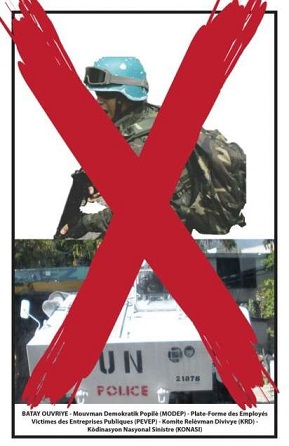 One hundred years of foreign domination is not just a crime of immense proportion, it is also an attempt to wipe out the dignity of a people left to fend to itself. One hundred years of manipulation, extortion, assassination—in grand scale—and blatant zombification marks a century of a people yearning for social justice, democratic governance and human rights—right to a decent education, to a decent employment and to affordable healthcare, the three fundamental human rights ratified by the Geneva Convention.
One hundred years of foreign domination is not just a crime of immense proportion, it is also an attempt to wipe out the dignity of a people left to fend to itself. One hundred years of manipulation, extortion, assassination—in grand scale—and blatant zombification marks a century of a people yearning for social justice, democratic governance and human rights—right to a decent education, to a decent employment and to affordable healthcare, the three fundamental human rights ratified by the Geneva Convention.
No one knew what overtly began on a dreaded July 28th of 1915 and subsequently continued as a covert operation in 1934 was going to last this long. One hundred years later, Haiti still falls prey to the wishes of its enemies.
This fact-finding reality is in no way symptomatic to a self-defeating sentiment. Nor is it the mere acceptance that our country was doomed from the start. Let us remind ourselves that the disenfranchised masses of Haiti and their natural allies—union workers, university students and intellectuals—never remain idle in the face of direct military occupation and entrenched neocolonialism. There has always been resistance against of all forms of social injustices and violation of human rights in Haiti.
In 1915, while the Haitian elite sided with the occupier, the masses rose up under the leadership of Charlemagne Masséna Péraltre and Benoit Betraville. Heroically they resisted. Against all odds, they fought and died, winning battles in between, only to be betrayed and ultimately lost to the logic of war.
The resistance did not stop, however, with the crucifixion of Péralte and the assassination of his top lieutenant Benoit Batraville. It continued with an ever more, unbelievable urge to reconquer independence. Contemporary historians have documented on gruesome atrocities committed by US Marines between 1915 and 1929, including the mass killings of dozens of peaceful peasant demonstrators at the crossroads of Marchaterre on December 6, 1929, near the city of Les Cayes, as they resisted forced labor imposed on them by the occupying force.
When it became clear Haiti could not be tamed as it were the case in some other places, the United States in 1934 withdrew its forces, but increased its diplomatic influence. The departing marines left behind its auxiliary, the National Guard, a kind of military police, as guarantor of US interests in Haiti.
In 1946, the masses rose up again, demanding social justice, democratic governance and the rule of law. They succeeded in overthrowing the autocratic rule of President Elie Lescot—only to watch their victory went up in smoke, stolen from them by traditional politicians and foreign diplomats whose interests were completely at odds with that of the Haitian masses.
During the Duvalier dynasty, the repression became systematic. Fifty thousand Haitians perished as documented by Amnesty International and other human rights organizations. When the Duvaliers finally left in 1986, the struggle for social, financial and political independence had reached an unbelievable proportion. The masses wanted change—fundamental change. The sharper the struggle, the greater the work of foreign embassies to control the Haitian government made up of politicians totally submissive to foreign interests in the country.
Before our eyes, one hundred years have gone by, as we watch Haiti being reduced to its lowest form of expression. The state bureaucracy has become the Holy instrument from which petty bourgeois would fill their lots in order to create a bourgeoisie “bureaucratique” where they all feel shamelessly at ease after fulfilling their class aspirations. Utterly disenfranchised, an entire generation of young Haitians have resorted to selling their bodies, sometimes to UN troops stationed in their country, and their dignity just to survive through the unforgiving streets of major cities of Haiti.
To circumvent this cycle of despair, we need a complete break from the past. We are asking all Haitians of good faith, all compatriots who believe Haiti MUST be free to join hands in an effort to rescue our country from the grip of its enemies. We need a new social contract to guide us through the dark days that lie ahead. We need to fight for a new and total independence where honesty in public affairs will be the norm rather than the mere exception.
Haitians everywhere, let’s join hands and seize upon the upcoming July 28th 2015—which will mark 100 years of foreign domination in Haiti—to create a movement that will ultimately bring about that change we all long for. In your city, in your town, in whatever the corner of the world you may be, let’s start reflecting upon what needs to be done.
Let’s stop whining!
Let’s start anew!
Long Live Haiti!
For the Florida Committee:
Ardain Isma
Camille Gauthier
Christine Jean-Pierre
Mesila Marcou
Jacob Davis

